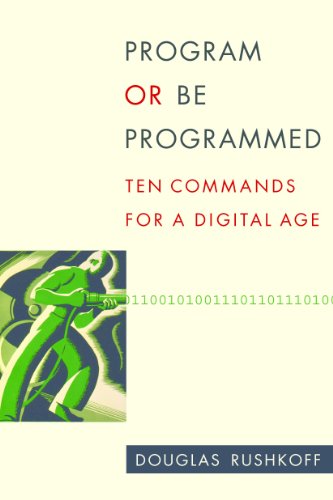Program or Be Programmed by Douglas Rushkoff Link to heading
Summary Link to heading
“Program or Be Programmed: Ten Commands for a Digital Age” by Douglas Rushkoff is a thought-provoking examination of how digital technology influences our lives and how we should respond to these changes. Rushkoff outlines ten “commands,” which are essentially guiding principles to help navigate the digital landscape. These commands address the impact of technology on various aspects of our lives, such as time, location, choice, complexity, scale, identity, social interaction, and the way we perceive reality. The book emphasizes the importance of understanding and engaging with the programming that drives digital technologies, arguing that those who do not understand programming are at risk of being controlled by those who do.
Review Link to heading
Rushkoff’s book is an insightful and engaging read that challenges readers to think critically about the role of technology in their lives. One of the book’s strengths is its approachable language, making complex ideas about technology and society accessible to a wide audience. The “ten commands” structure offers a clear framework for readers to follow and apply in their personal and professional lives. However, some critics may find the book a bit alarmist, as it stresses a dichotomy between programming and being programmed. Nonetheless, Rushkoff effectively underscores the need for digital literacy and the empowerment it brings.
Key Takeaways Link to heading
- Understand Programming: Gain basic knowledge of how programming works to better navigate and control digital technologies.
- Time Management: Recognize that digital technologies operate in real-time, and learn to manage your time accordingly.
- Remain Present: Resist the urge to be constantly available or distracted by technology. Be present in each moment.
- Digital Identity: Be aware of how digital interactions shape perceptions of identity and reality.
- Empowerment Through Participation: Engaging with technology by actively participating (like learning to code) can democratize control rather than centralize it among a few.
Recommendation Link to heading
“Program or Be Programmed” is highly recommended for anyone interested in understanding the broader implications of digital technologies on society, especially those concerned with issues of digital literacy, empowerment, and control. It’s particularly useful for educators, technologists, policy makers, and anyone who wants to gain a greater understanding of the subtle yet significant ways technology shapes our lives. Rushkoff’s ten commands offer practical guidance for living more intentionally in the digital age.
